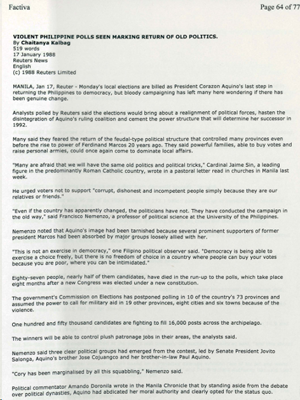VIOLENT PHILIPPINE POLLS SEEN MARKING RETURN OF OLD POLITICS
[Reuters]
Published date: 17th Jan 1988
17 January 1988
Reuters News
English
(c) 1988 Reuters Limited
MANILA, Jan 17, Reuter – Monday’s local elections are billed as President Corazon Aquino’s last step in returning the Philippines to democracy, but bloody campaigning has left many here wondering if there has been genuine change.
Analysts polled by Reuters said the elections would bring about a realignment of political forces, hasten the disintegration of Aquino’s ruling coalition and cement the power structure that will determine her successor in 1992.
Many said they feared the return of the feudal-type political structure that controlled many provinces even before the rise to power of Ferdinand Marcos 20 years ago. They said powerful families, able to buy votes and raise personal armies, could once again come to dominate local affairs.
“Many are afraid that we will have the same old politics and political tricks,” Cardinal Jaime Sin, a leading figure in the predominantly Roman Catholic country, wrote in a pastoral letter read in churches in Manila last week.
He urged voters not to support “corrupt, dishonest and incompetent people simply because they are our relatives or friends.”
“Even if the country has apparently changed, the politicians have not. They have conducted the campaign in the old way,” said Francisco Nemenzo,·a professor of political science at the University of the Philippines.
Nemenzo noted that Aquino’s image had been tarnished because several prominent supporters of former president Marcos had been absorbed by major groups loosely allied with her.
“This is not an exercise in democracy,” one Filipino political observer said. “Democracy is being able to exercise a choice freely, but there is no freedom of choice in a country where people can buy your votes because you are poor, where you can be intimidated.”
Eighty-seven people, nearly half of them candidates, have died in the run-up to the polls, which take place eight months after a new Congress was elected under a new constitution.
The government’s Commission on Elections has postponed polling in 10 of the country’s 73 provinces and assumed the power to call for military aid in 19 other provinces, eight cities and six towns because of the violence.
one hundred and fifty thousand candidates are fighting to fill 16,000 posts across the archipelago.
The winners will be able to control plush patronage jobs in their areas, the analysts said.
Nemenzo said three clear political groups had emerged from the contest, led by Senate President Jovito Salonga, Aquino’s brother Jose Cojuangco and her brother-in-law Paul Aquino.
“Cory has been marginalised by all this squabbling,” Nemenzo said.
Political commentator Amando Doronila wrote in the Manila Chronicle that by standing aside from the debate over political dynasties, Aquino had abdicated her moral authority and clearly opted for the status quo.
“Until the structure of politics is altered in such a way that people would be more independent of rich and powerful patrons, it is a farce to say that the people can use the ballot as a means to re-distribute power away from the political clans,”he said.






